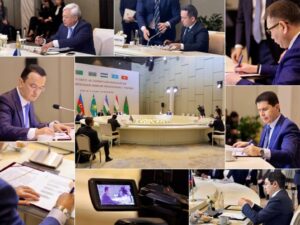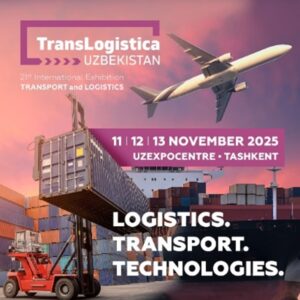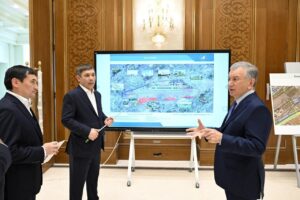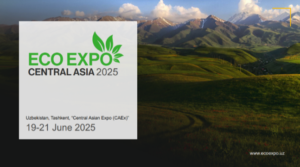
On November 13, 2025, the first meeting of the Council of Ministers of Trade and Investment of Central Asian countries and Azerbaijan was held in Tashkent.
The event was aimed at strengthening practical cooperation between the countries of the region in the areas of trade, investment, and industrial cooperation, as well as implementing joint initiatives to increase mutual trade and create cooperative production facilities.
Particular attention was paid to the creation of working tools to increase trade turnover between the countries of the region to $20 billion, the formation of joint production sites under the “Made in Central Asia” brand, as well as the involvement of international financial institutions and large investors in the implementation of joint infrastructure and industrial projects.
It was noted that mutual trade between Uzbekistan and the countries of Central Asia is showing steady positive dynamics. While trade turnover amounted to $3.2 billion in 2017, by 2024 it had more than doubled, reaching $6.9 billion. In particular, trade turnover with Kazakhstan is approaching $4 billion, with Kyrgyzstan — $700 million, with Tajikistan — exceeding $570 million, and with Turkmenistan — more than doubling over the past five years to $1.15 billion. Trade with Azerbaijan has also shown significant growth, up 13% since the beginning of the year.
During the meeting, the need for further optimization of customs and border procedures, synchronization of transport and logistics infrastructure, and the creation of industrial hubs capable of uniting the production chains of the countries in the region was also emphasized. Particular attention was paid to issues of industrial cooperation, joint development of raw material and technological potential, and the development of exports of finished products with high added value.
Following the meeting, a joint communiqué was signed, setting out key agreements on deepening economic cooperation, developing cooperation and joint production, and creating new mechanisms for investment interaction.

The Embassy of the Republic of Uzbekistan invites interested Ukrainian companies to participate in the 21st International Exhibition “Transport and Logistics – TransLogistica Uzbekistan 2025”, which will be held on November 11–13, 2025, at the Uzexpocenter Exhibition Complex in Tashkent.
The event traditionally brings together leading specialists in the transport and logistics industry and is Uzbekistan’s key specialized platform for establishing direct contacts between suppliers, manufacturers, and service customers. The exhibition provides opportunities to exchange experience, establish business contacts, and find modern solutions for business development.
The exhibition’s business program includes key events:
• Uzbekistan Airports, Aviation and Logistics Forum (November 11);
• 45th meeting of the CIS Coordination Council for Transport (CCCT) (November 12).
To attend the event, you must register at the link.

The Embassy of the Republic of Uzbekistan invites interested persons to visit the international exhibition “HoReCa Expo Uzbekistan 2025”, which will be held from October 21 to 23, 2025 in Tashkent at the “Uzexpocentre”.
The exhibition will showcase modern technologies and equipment for hotels, restaurants, catering and trade.
Visitors to HoReCa Expo Uzbekistan will be offered a full range of kitchen equipment, food and beverage products, furniture, textiles, IT solutions, security systems and many other solutions.
The main theme of the exhibition “Investments in service and comfort: business solutions for HoReCa” will include sessions on the following topics:
Exhibitors and guests of the exhibition will have the opportunity to get acquainted with the latest trends in the hospitality industry, establish contacts with key market representatives, new suppliers, partners and investors within the framework of organized B2B and B2C meetings, take part in master classes and seminars by international experts, and discover the latest innovations in the HoReCa sector.
For more details and registration, please follow the link.
INFORMATION FOR BUSINESS REPRESENTATIVES
For the attention of Ukrainian business representatives interested in establishing business relations with Uzbekistan, please find below some commercial offers for the supply of Uzbek goods and promising investment projects for consideration:
Commercial offers – http://bit.ly/4k1wNkk
Investment projects – http://bit.ly/3HRnPJ4
Exhibitions and fairs – http://bit.ly/4lczZKQ
If you have any questions, you can contact the Commercial Section of the Embassy of the Republic of Uzbekistan in Ukraine at the following contact details:
e-mail: info@uzbekistan.org.ua
tel.: +380445014184, +380445015000

The Embassy of the Republic of Uzbekistan invites Ukrainian companies to take part in the international exhibition TextileExpo Uzbekistan Autumn 2025, which will be held from September 9 to 11, 2025 in Tashkent at the National Exhibition Complex “Uzexpocentre”.
The exhibition will feature a wide range of products: ready-to-wear, textiles, knitwear, yarns and fabrics. More than 300 companies, including more than 100 Uzbek exporters, will take part in the event, presenting a wide range of textile products.
Participation in the exhibition opens up unique opportunities for establishing business contacts, finding new suppliers and expanding export markets.
For more information about the exhibition and to register, please follow the link.

On June 18, the President of Uzbekistan inspected the construction of the new Tashkent East Airport, one of the country’s strategic infrastructure projects.
Construction on the former military airfield started in 2017.
The future airport is positioned as a transportation hub for the capital and the New Tashkent under construction. Its main activities will be receiving official visits and business trips of foreign investors. It is expected that its opening will stimulate the development of the tourism industry in Tashkent region.
According to the presented master plan, the total area of the new air harbor will be 561 hectares. The passenger terminal will serve up to 100 people per hour. The airfield’s apron will be able to park 23 double-deck Boeing 747s simultaneously.
The first phase of work, including the renovation of a 4-kilometer runway, was completed in 2023.
The airfield is capable of handling aircraft of all classes, including the heaviest ones.
The construction of two terminals is underway to accommodate official delegations and business aviation, as well as a runway and hangars for aircraft maintenance. The airport will be equipped with modern ICAO Class III-A radio and meteorological equipment. It will become the first air hub in Central Asia with ICAO Category III-A, which will allow it to receive flights even in fog and zero visibility.
The renovation of Tashkent-East is aimed at creating a modern, convenient and safe air hub that will relieve the capital’s main international airport and increase the overall level of air traffic.
Thanks to its favorable location, Tashkent-East will be able to reduce the load on the capital’s main international airport and increase the capacity of the country’s entire aviation infrastructure.

The Embassy of the Republic of Uzbekistan in Ukraine invites Ukrainian companies and interested organizations to PARTICIPATE in the largest international exhibition in Central Asia dedicated to ecology and sustainable development — ECO EXPO CENTRAL ASIA 2025, which will be held in Tashkent from June 19 to 21, 2025.
The exhibition will bring together global companies working in the field of eco-technologies, innovative start-ups, state and international organizations, and experts in sustainable development.
The industrial zones of the exhibition will cover 16 thematic areas, each reflecting key aspects of sustainable development.
These include greening, green finance and economy, ecotourism, Aral ecology, renewable energy, green construction, water and energy saving technologies, digital education and knowledge, sustainable agriculture, recycling and clean technologies, protected natural areas, green transport, green cities, ecological culture, artificial intelligence and ecology, as well as sustainable initiatives in the FMCG and retail sectors.
Each section will feature cutting-edge technologies, stands of leading companies and start-ups, and interactive simulations.
To register and receive additional information, please follow the link.